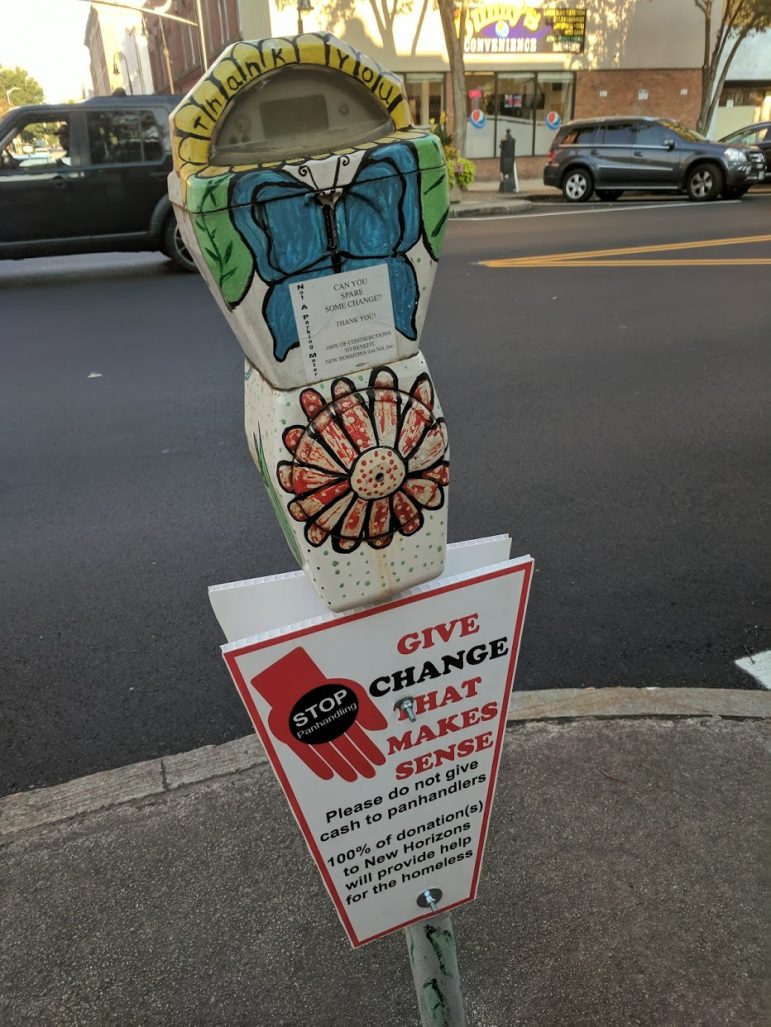
CONCORD, NH – In a 65-page decision handed down Sept. 7, the New Hampshire District Court struck down the City of Manchester’s anti-panhandling ordinance and police practices because they violated the First Amendment.
This lawsuit was brought on behalf of Theresa M. Petrello, an Army and Navy veteran who has panhandled to make ends meet. On June 3, 2015, the Manchester police department cited her for disorderly conduct after she, without stepping in a roadway, engaged in peaceful panhandling speech directed at motorists from a public place. Ms. Petrello was represented by Gilles Bissonnette, the Legal Director of the ACLU of New Hampshire (ACLU-NH), and Elliott Berry of New Hampshire Legal Assistance (NHLA).
“No one wants to see a veteran of our armed forces panhandling for help on a street corner. But criminalizing this act of desperation, detaining and prosecuting people when they seek help, does nothing to solve the problems of poverty and homelessness in our state, and may in many cases make it harder for people to get back on their feet by saddling them with a criminal record, fines and fees they have no ability to pay,” said Berry, managing attorney of the Manchester branch of New Hampshire Legal Assistance.
When contacted by ManchesterInkLink Friday, Manchester Police Chief Nick Willard deferred to the city solicitor’s office, which is “analyzing the decision and evaluating our options.”

Since the 2015 suit was filed, Manchester has aggressively sought to reduce panhandling by urging the public not to give money to those begging for handouts. The city’s main initiative has been through signage posted prominently on major roadways where panhandlers have been known to station themselves, and also with sandwich boards along Elm Street, in front of businesses.
This lawsuit challenged Manchester’s anti-panhandling ordinance, which was enacted on October 6, 2015. This ordinance criminalized a person peacefully receiving a charitable contribution from a person in a motor vehicle, even if the recipient is in a public place and is not in a roadway. Similar ordinances have been enacted in Concord, Somersworth, and Rochester.
The Court concluded that the ordinance violated the First Amendment because it “burdens substantially more speech than is necessary to further the City’s legitimate safety interests.” As the Court explained, the ordinance was not tailored to roadway safety because:
- it “bans roadside exchanges that do not obstruct traffic or pose a safety risk”;
- it “is geographically overinclusive because it applies citywide”;
- it “is underinclusive because it penalizes only pedestrians, not motorists”;
- and “the City has less speech-restrictive means available to address its concerns,” like enforcing traffic laws.
Thus, the Court concluded, the ordinance unconstitutionally burdened “the protected speech of pedestrians who are not standing in the road and thus not physically obstructing traffic.” The Court noted that Manchester cannot sacrifice the First Amendment for the sake of efficiency.
The lawsuit also separately challenged the constitutionality of the Manchester police department’s practice of detaining, dispersing, and charging peaceful panhandlers under New Hampshire’s disorderly conduct statute, for allegedly “obstructing vehicular traffic on public streets” even when the panhandlers are in a public place and do not step in the roadway. Between March 2015 and March 2016, at least 10 different Manchester police officers issued a total of 19 summonses against panhandlers who, like Ms. Petrello, did not step in the roadway and were in public places.
As the Court held, this practice violated the First Amendment because it “burdens substantially more speech than necessary to further” the legitimate interest of maintaining traffic safety. The Court explained that this policy operated “as a de facto ban on panhandling” – even by those who do not step in the road – “and thereby chills substantially more speech than necessary to serve the City’s interests.” The Court added that the City has available measures to address public safety other than suppressing speech, which include limiting enforcement of disorderly conduct statute to those who step in the roadway, and enforcing the statute against motorists who stop in the road at a green light to give to a panhandler.
“This decision is a victory for free speech, as well as judicial recognition that cities and towns need to stop criminalizing poverty in New Hampshire,” said Gilles Bissonnette, the Legal Director for the ACLU-NH. “In Manchester, panhandlers, including veterans like Ms. Petrello, were and are peacefully soliciting motorists from public places without stepping in the roadway. They were and are committing no crime. They were engaging in protected speech . The ACLU-NH has already contacted the other cities that enacted similar unconstitutional ordinances and asked them to cease enforcing them.”
“Manchester’s policies were targeting panhandlers who were peaceful, not panhandlers who were alleged to have acted aggressively or to have stepped in the roadway,” said Elliott Berry of NHLA. “These individuals were seeking charity. Instead of charity, Manchester charged them and sent them to court. We are thankful that, earlier this year, Manchester apparently voluntarily stopped these practices, and now a Court has ordered them to do so permanently.”







